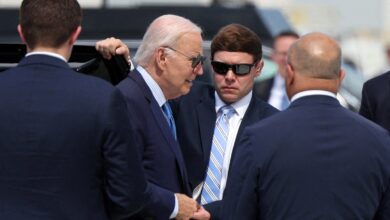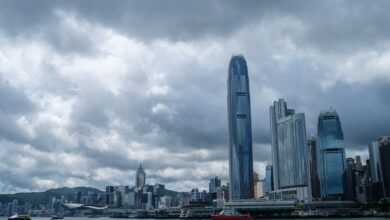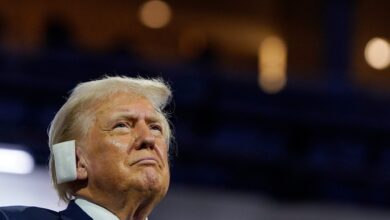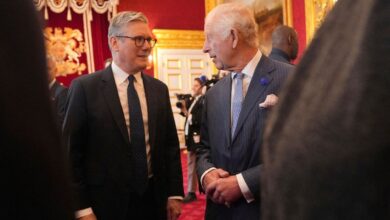Several police kidnapped in Ecuador after state of emergency declared
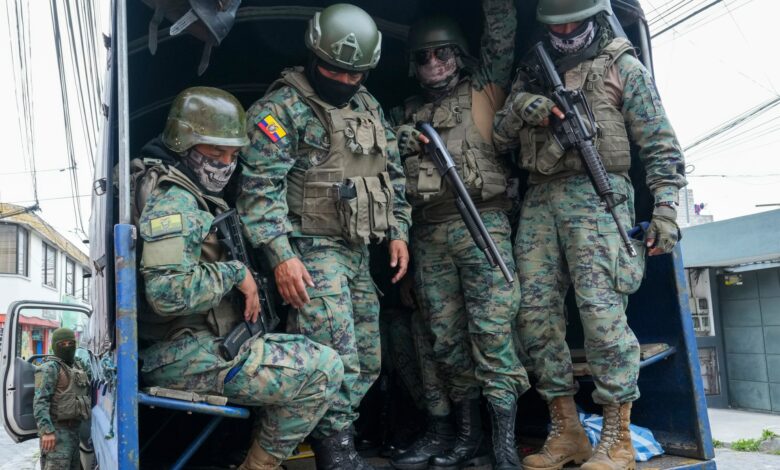
A live broadcast by Ecuadorean television station TC was interrupted by a group of armed people who forced staff to lie and sit on the floor, as shots and yelling were heard. The country’s president has declared 22 gangs as terrorist organisations and said that the country is in a state of “internal armed conflict”.
The people, wearing balaclavas and largely dressed in black, were seen wielding large guns and accosting huddled staffers on the live feed, which eventually cut out on Tuesday. It is unclear if any station personnel were injured.
Some of the invaders gestured at the camera and someone could be heard yelling “no police”.
Another channel showed images of police outside TC’s studios in Guayaquil, a coastal city that has been plagued by surging violence over the last several years as narcotrafficking groups step up operations in the once relatively peaceful South American nation.
“I am still in shock” Alina Manrique, the head of news for TC Television who says she had a gun pointed to her head during the incident, told The Associated Press.
CAPTURADOS
Como resultado de la intervención en @tctelevision #GYE, nuestras unidades policiales hasta el momento logran la aprehensión de varios sujetos e indicios vinculados al ilícito.
Posterior más detalles… pic.twitter.com/tPq7FfaGcM
— Policía Ecuador (@PoliciaEcuador) January 9, 2024
“Everything has collapsed …. All I know is that its time to leave this country and go very far away.”
Ecuador’s national police said on social media that its specialised units had been deployed to the site, and police confirmed that 13 arrests had been made. The national police posted images of several men with their hands zip-tied behind their backs, stating that they were captured in their intervention at the studio.
The incident came after at least seven police officers were kidnapped, explosions occurred in several cities and prison inmates seized dozens of guards as hostages, a day after President Daniel Noboa declared a state of emergency.
Noboa issued a decree on Tuesday stating that the country was in a state of “internal armed conflict” and declaring 22 gangs as terrorist organisations. The decree ordered the armed forces to “neutralize” the groups, in line with international law and human rights.
The United States’s top diplomat for Latin America expressed concern about the situation.
“Extremely concerned by today’s violence & kidnappings in Ecuador,” the State Department’s Brian Nichols, wrote on X, adding that American officials would “remain in close contact” with President Daniel Noboa’s team.
Peru’s Prime Minister Alberto Otarola, meanwhile, declared an emergency along his country’s northern border with Ecuador, saying an unspecified number of army troops would be deployed to support police forces in the area.

In countries throughout Latin America, governments have often taken harsh measures to crack down on the production and movement of drugs, giving a blank cheque to armed forces with long records of abuse and rights violations. Critics say such efforts have helped fuel cycles of brutal violence in countries like Mexico and Colombia, while failing to stem the lucrative flow of narcotics.
But as a wave of violent crime has crashed over Ecuador, politicians have looked to stake out tough positions on crime and the growing influence of narcotraffickers.
Some have pointed to the success of El Salvador’s President Nayib Bukele, who has suspended key civil liberties and swept thousands of people into prison with little semblance of due process in order to strike a blow against criminal gangs in the country.
No negotiation
Noboa, a former legislator and son of one of the country’s richest men, took office in November on promises to fix the struggling economy and stem the violence on the streets and in prisons, which has been growing for years.
Noboa declared the 60-day state of emergency – a tool used by his predecessor to little success – on Monday, enabling military patrols, including in prisons, and setting a national nighttime curfew.
The measure was a response to the disappearance of Adolfo Macias, leader of the criminal gang Los Choneros, from the prison where he was serving a 34-year sentence, and unrest at six other prisons, including prison guards being taken hostage.
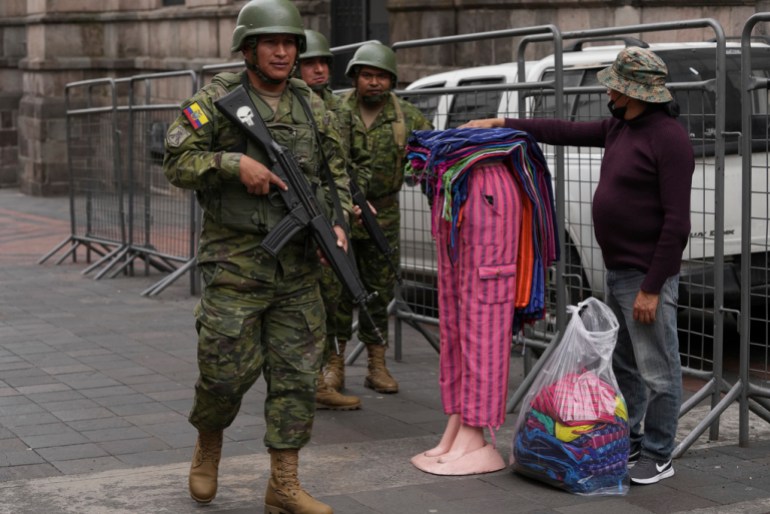
Police and prosecutors have given little information about the disappearance of Macias, also known as Fito.
Three police officers working the night shift were taken from their station in the southern city of Machala, the police said on social media on Tuesday, while a fourth missing officer was taken by three people in Quito. Another three officers were kidnapped in Los Rios province after a patrol was hit by an explosive.
“These acts will not remain in impunity,” said the police, who have given no details on whether the kidnappers have issued demands.
The police said there were explosions in the provinces of Esmeraldas and Los Rios, while the mayor’s office in the city of Cuenca confirmed another and the attorney general’s office said it was investigating one in Guayaquil.
Local media have also reported explosions in Loja and Machala.
Authorities have not given a cause for any of the explosions and no one has claimed responsibility.
Noboa has said he will not negotiate with “terrorists” and the government has blamed recent incidents of prison violence on the president’s plan to build a new high-security prison and transfer jailed gang leaders.
The prisons agency has given no information about the guards who are being held hostage.

Ecuador has seen violence explode in recent years as rival gangs with links to Mexican and Colombian cartels vie for power.
Drug violence has taken a heavy toll. There were more than 7,800 homicides and 220 tonnes of drugs seized last year, a new record for a country of about 18 million people.
Since February 2021, clashes between prisoners have killed more than 460 people.
